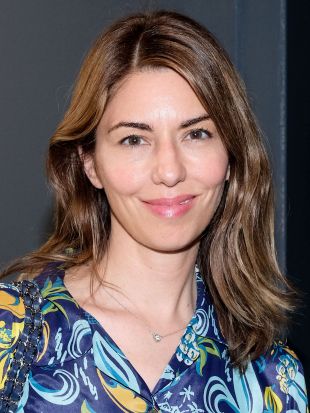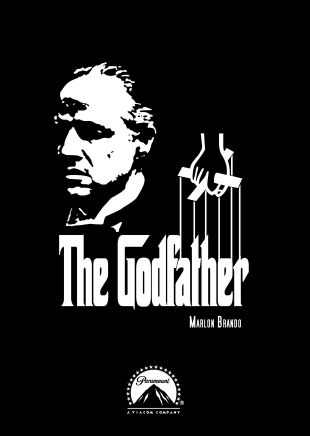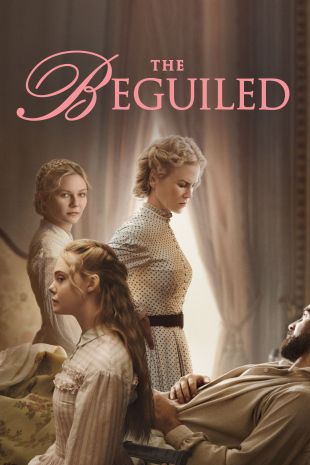Perhaps it makes sense that a woman whose earliest memory was on the set of Apocalypse Now would grow up to direct a dark fable about five adolescent girls who unapologetically and unceremoniously kill themselves, but for Sofia Coppola, the path to the director's chair was an uncertain one. Literally christened into a filmmaking career, the third child and only daughter of Francis Ford and Eleanor Coppola was born in Manhattan in the spring of 1971, during the production of her father's masterpiece, The Godfather. When it came time to shoot the baptism scene near the end of the film, the elder Coppola didn't have to look very far for an infant, and the epic became the impromptu actress' first, uncredited role. He found another bit part for the tiny Sofia in The Godfather Part II before her memorable experience on the tumultuous set of Apocalypse, as recorded in Eleanor's 1991 documentary of the making of the film, Hearts of Darkness: A Filmmaker's Apocalypse. Coppola continued to pop up in her father's films in the early '80s and even ventured outside of the clan for a spot in 1987's Anna. It wasn't until father and daughter collaborated on a segment in the 1989 anthology film New York Stories, however, that Sofia began to attract critical attention -- albeit of a disparaging ilk. She and Francis co-wrote the half-hour children's fantasy Life Without Zoe in an attempt to evoke the glamorous, candy-colored world of the classic Eloise children's tales. In her dual role as costume designer, the 17-year-old swathed the film's lead characters in lavish designer jewelry and threads. Unfortunately, the Coppola portion of the film almost universally bewildered critics, who found it too trifling for adults and too baffling for children. By then a high school graduate, Sofia retreated from the world of filmmaking and concentrated on fashion design, contributing her costuming talents to The Spirit of '76 (1990), a Dazed and Confused-style comedy co-written by her brother Roman. Fate intervened, however, when cloudy circumstances forced Winona Ryder to bow out of Francis' much-anticipated The Godfather Part III. Sofia was swiftly cast in the role of Mary Corleone, and rumors regarding her acting chops -- or lack thereof -- began to swirl before she even shot a scene. When the film was released in late 1990, critics had a field day with her minor, but rather wooden, performance, finding it "hopelessly amateurish" and unintentionally comical. Even her aquiline profile became fodder for ridicule, and in March 1991, the Razzie Awards gave her the dubious distinction of Worst Supporting Actress as well as Worst New Star. Again, Coppola recoiled from Hollywood, entering the fine arts program at the California Institute of the Arts. There she began to nurture her interests in photography as well as costuming and experimented with video shorts. As their first post-graduate effort, she and some friends created the TV series High Octane, an offbeat news magazine on cable's Comedy Central network. The show was discontinued in 1994 after just four episodes, and Coppola continued to work on her brother's projects, primarily music videos. Around this time, Coppola read Jeffrey Eugenides' 1993 novel The Virgin Suicides and was captivated by its dark, haunting take of adolescent sexuality. More significantly, she relished the challenge of translating the fervid, pubescent-male viewpoint of the book to the big screen, and she began writing her own screen adaptation of the text. Coppola was undaunted when she found that the rights to the book were already secured by Muse Productions, whose script was much more violent and overtly sexual than hers. Impressed with her work, Muse scrapped their version and backed Coppola. After securing a stellar cast -- including James Woods, Kathleen Turner, and Kirsten Dunst -- and the production assistance of her father, she began shooting the film in Toronto. When the finished work premiered in the Directors Fortnight of the 1999 Cannes Film Festival, the reception was an about-face from her previous run-ins with the press. Critics applauded Coppola's delicate, evocative handling of the tale, as well as her subtle, dream-like visual sense, aided by ace cinematographer Edward Lachman. Paramount Classics picked up the film for distribution in May 2000, when it received a brisk arthouse run. In the summer of 1999, Coppola indoctrinated yet another filmmaker into her already distinguished clan of actors, composers, and auteurs when she married director Spike Jonze, whom she had met on the set of a Sonic Youth music video at the beginning of the decade. Jonze shot his first feature -- the critically acclaimed Being John Malkovich -- at the same time Coppola was helming her debut. Just as her husband was faced with the challenge of following up such a promising debut, Coppola too spent the years after The Virgin Suicides dabbling in TV production (on the ill-fated UPN hip-hop soap Platinum) and developing her sophomore feature. This time, however, she chose to fashion a screenplay not based on existing material but on her own experiences visiting Japan in her early twenties. The resulting character study, 2003's Lost in Translation, drew from a disparate set of memories: her father's work on a liquor ad with Akira Kurosawa in the mid-'70s, her memories of a former mentor in the fashion industry, and her own uncertainty over her future. Starring Bill Murray and Scarlett Johansson as two similarly displaced, maritally dissatisfied Americans toiling away the hours in a posh Tokyo hotel, the film built upon Suicides' ethereal, deliberate pace and tone as it offered Murray one of the most textured, soulful roles of his career. An autumn arthouse smash that managed to cross over to mainstream audiences, Translation remained in theaters well into the new year, as the film, its director, and two leads were showered with accolades from critics' groups and industry organizations. After winning Golden Globes for Best Screenplay and Picture (Comedy or Musical), the young filmmaker took home the prize for Best Original Screenplay at the 2004 Academy Awards. Coppola also made history by becoming the first American woman to receive a Best Director Oscar nomination, though she ultimately lost the award to Peter Jackson. Lost in Translation's success garnered attention of another sort: critics and audiences speculated that Coppola's marriage to Jonze was not-so-discreetly mirrored in one of Translation's plot threads -- the distant relationship between Johansson's character and her flighty photographer husband, played with a Jonze-like intensity by Giovanni Ribisi. Sure enough, Coppola and Jonze announced their divorce plans in December 2003, and the indie film world lost its nascent royal couple. After the mirrored triumphs of Suicides and Lost, rumors swirled in the trades surrounding Coppola's tertiary effort in the director's chair, which she announced as an adaptation of Antonia Fraser's historical novel Marie Antoinette: The Journey. The 2006 period piece/costume drama starred Virgin lead Kirsten Dunst as the titular queen of France and archduchess of Austria, alongside a four-star cast highlighted by the presence of Jason Schwartzman (the director's cousin), Judy Davis, and the venerable Rip Torn as King Louis IV. She returned four years later with Somewhere a story about the relationship between a jaded actor played by Stephen Dorff and his young daughter.

Sofia Coppola
Share on
Biography by AllMovie
Movie Highlights
Factsheet
- Made her film debut at three months as the baby in the famous baptism scene at the end of The Godfather; also appeared as a toddler on a New York-bound ship in The Godfather, Part II.
- Interned at Chanel's Paris headquarters for two summers during her teen years.
- Dropped out of Mills College in her first year when her father picked her as a last-minute replacement for an ailing Winona Ryder as Mary Corleone in The Godfather, Part III; the choice was a controversial one (she had no significant acting experience) and critics lambasted her performance.
- Launched her Milk Fed clothing line, specializing in casual attire, in 1994.
- Like the Hustons (Walter, John and Anjelica), there are three generations of Oscar winners in the family: Sophia; her father, Francis Ford Coppola; her grandfather Carmine Coppola; and cousin Nicolas Cage.
- Has collaborated with her husband, musician Thomas Mars, on numerous movies. They met while producing the soundtrack for her film The Virgin Suicides.


